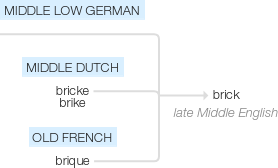Brick
late Middle English: from Middle Low German, Middle Dutch bricke, brike ; probably reinforced by Old French brique ; of unknown ultimate origin.
wiktionary
From late Middle English brik, bryke, bricke, from Middle Low German and Middle Dutch bricke("cracked or broken brick; tile-stone"; modern Dutch brik), ultimately related to Proto-West Germanic *brekan(“to break”), whence also Old French briche and French brique(“brick”). Compare also German Low German Brickje(“small board, tray”). Related to break.
etymonline
brick (n.)
"rectangular block of artificial stone (usually clay burned in a kiln) used as a building material," early 15c., from Old French briche "brick," which is probably from a Germanic source akin to Middle Dutch bricke "a tile," etymologically "a bit, a fragment, a piece broken off," from the verbal root of break (v.).
Of a brick-shaped loaf by 1735. Meaning "a good, honest fellow" is from 1840, probably on notion of squareness (as in fair and square), though in English brick and square when applied to persons generally are not meant as compliments. Brick wall in the figurative sense of "impenetrable barrier" is from 1886. Brick-and-mortar (adj.) as figurative of "physically real" is from 1865. To do something like a ton of bricks "vigorously" is from 1929 (earlier thousand of bricks, 1836), probably from the notion of how hard such a weight of them falls or hits.
brick (v.)
"to wall up with bricks," 1640s, from brick (n.). Related: Bricked; bricking.
